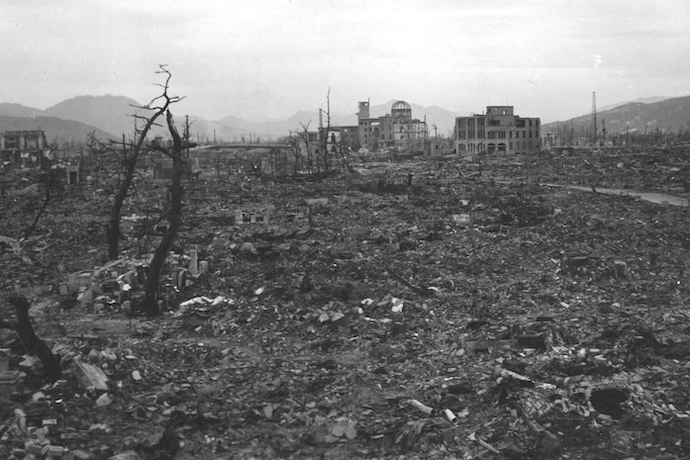
Longform
Is Nuclear First Use Ever Permissible?
During a conventional war against another sovereign nation, is it ever permissible for a country to employ nuclear weapons against the other and not violate the laws of war or its foundational principles? Russia’s various recent statements, and America and NATO’s willingness to respond to them (even if they are Kremlin political theater) indicate that asking such questions has more salience than many in the world wish to admit.
This article will attempt to summarize those who believe a nation can never employ nuclear weapons against its enemy because such employment will always violate the laws and its principles. After providing important background information on key terms and events embedded in the question, I will identify and explain the various argumentative camps, before concluding with the many themes, biases, and assumptions those camps take.
The Laws of War: Sources & Guiding Principles
The laws of war describe the totality of international laws and norms defining how nations may properly conduct themselves during war. The laws apply to both international and domestic theaters. Their primary goal is to reduce the overall suffering all parties involved in the war must endure. This is done to limit the inherently destructive nature of war, thereby hastening its end and expediting the restoration of peace. This article will use the terms war, armed hostilities, and armed conflict to mean the same event. For the sake of space, the laws of war and international humanitarian law are treated as synonymous.
The laws of war originate from two main sources. The first is international agreements, conventions, charters, or rulings from international judicial bodies that dictate practices deemed acceptable when conducting war. The most famous examples include the Geneva and Hague Conventions, their successive protocols, and rulings by the International Court of Justice (ICJ), especially the 1993 and 1995 decisions specifically related to nuclear weapons and employment. Regarding the Geneva Conventions, nearly every nation on earth has signed and ratified aspects in the form of international treaties.
However, this does not mean that nations that fail to ratify or agree with all agreements or principles are not liable for their violations. This is the result of the second source of the laws of war: customary law. Customary laws are the established war-fighting norms held by most nation-states. These are normally found in the official manuals of a nation’s defense agency or ministry. If state practice is sufficiently widespread enough, the rules of customary international law bind all states—even states that do not necessarily participate in that practice.
The foundation for the laws of war is the interdependent guiding principles. In the absence of court rulings, agreements, or customary law, these provide military and civilian leaders participating in the conflict with an ethical framework that explicitly states what is and is not proper behavior. While there remains some variation, the Department of Defense summarizes them as Military Necessity, Humanity, and Honor.
Military Necessity is the justification for a state to use military force in a state of armed conflict. However, states and their militaries are not given unlimited powers to use force. The force employed must be done to defeat the enemy as quickly, efficiently, and humanely as possible. These constraints on force are necessary to prevent rash, unreasonable, or excessive actions that delay the ability to restore peace.
Humanity is composed of three sub-principles: Distinction, Proportionality, and Unnecessary Suffering. Distinction demands unarmed citizens must be spared personal property damage as much as the exigencies of war will permit. Warring states must therefore not intentionally target civilians and must calculate the extent to which military operations may cause damage to noncombatants. Thus, nations should primarily target and engage with enemy troops in the field of battle, as far away from civilians as possible.
Proportionality means that militaries should consider how much force is necessary to accomplish the ultimate military objective: restoring peace. If to restore the peace civilians become collateral damage, then the harm done to non-combatants (deaths, injuries, damage to civilian objects, or a combination thereof) may not be excessive when compared with the direct and concrete military advantage anticipated. Unnecessary Suffering is directly related to Proportionality, but it has also been expanded to include the physical environment surrounding the battlefield and the nations where the battles are being fought. Lastly, Honor necessitates that militaries must treat each other with dignity.
Self-Defense and Reprisals
According to the UN Charter, states are allowed to act with military force for self-defense purposes. However, self-defense is different from reprisal (which is categorized under self-help). Reprisals are offensive actions states may take in response to themselves coming under a form of unlawful attack. These are intended to deter future breaches of the laws of war and attacks by the enemy. Reprisals—in their most basic form—are breaches of the laws of war. However, there are extreme cases in which they are deemed legal and justifiable.
Self-defense differs from reprisal due to timing. Reprisals are present actions taken in response to a past event. Self-defense actions require a threat to be imminent. The capacity to know which threats are imminent and which creates three forms of self-defense-based actions under the laws of war. Anticipatory self-defense maneuvers are when a force wishing to harm a party is instant, overwhelming, leaves no choice of means, and no moment of deliberation, and when the very survival of the state is at stake. This is justified under the laws of war as legal actions.
The latter two, Preemptive and Preventive, remain debatable. Interpretation of events as imminent lacks definite proof of their threat level. If one is to follow the morally safest path when following the laws of war, states should avoid preemptive and preventive actions until greater knowledge of the intent of the enemy is understood to cross the threshold into anticipatory action.
Nuclear Weapon Employment vs Nuclear Weapon Use
Nuclear employment indicates a country intentionally launches and detonates a nuclear weapon during a war. The nuclear weapon could be used to either attack an enemy position or merely to display resolve. Nuclear use equates to utilizing nuclear weapons for deterrence-based purposes. John Gower, former UK Minister of Defence, provided the example that “the UK has used and is using nuclear weapons every day for 60 years in deterrence” but has never employed nuclear weapons. The only examples of nuclear weapon employment remain the bombings of Hiroshima and Nagasaki.

The Bombing of Hiroshima and Nagasaki (H&N)
Nuclear employment only occurred at Hiroshima and Nagasaki in 1945. Low-end estimates state that 110,000 people perished during the bombing runs, while higher-end calculations raise the number to 210,000. Those not obliterated were horrendously burned, showing black blood spots on their skin, losing hair, suffering heavy fever, diarrhea, and dying a few days later. Radiation fallout would cause many survivors to develop cancer (predominantly leukemia) years later.
***
Arguments Against Nuclear Employment
The Interdependent Principles Arguments (IPA)
At the heart of nearly all arguments against the employment of nuclear weapons rest the interdependency of each of the principles. Due to the ICJ’s inability to determine if nuclear employment is ever permissible under the laws of war, and in the absence of a treaty outright banning nuclear employment in conflict, the principles discussed earlier (combined with customary law) must fill the supposed “legal gap.” Opponents of nuclear employment believe the principles and customary law in effect make nuclear employment illegal. This section will primarily focus on IPA-centric logic.
The IPA views a violation of one of the principles as a tripwire: once one is broken the entire legality of the military operation is removed. The same can be applied to nuclear employment and the guiding principles of war. Supporters of the argument believe that there is no realistic chance that a nuclear weapon used in war will not violate at least one principle. The extensive, indiscriminate damage and lingering health effects witnessed at and after H&N would violate Humanity. Even “dial-a-yield” and other more sophisticated nuclear weapons fail to lessen the brutal damage caused by the bomb. The radioactive fallout and blast radius also damage the environment in a way that conventional forces could not. Conventional forces could also accomplish the mission of nuclear weapons with less of a risk of forestalling peace.
Because the principles are tripwires, merely proving one is broken means a state employing a nuclear weapon is violating the laws of war. Non-battlefield-oriented employment would also violate these principles. Merely launching and detonating a device as a show of force would also violate these principles due to the resulting risk of fallout.
Violation of Neutrality Arguments
Supporters of these arguments, again citing the indiscriminate nature of nuclear employment, claim that launching and detonating a bomb, whether with military intention or not during a conflict, directly violates ratified principles of the laws of war. These namely relating to the laws of neutrality. Warring nations violate international law if their conflict unnecessarily affects or drags neutral countries into the conflict.
These are the chief counterarguments to the pro-employers, those who believe nuclear employment can occur in accord with international law. Pro-employers argue a warring nation is permitted in launching and detonating a nuclear weapon with the intent of sinking an enemy submarine in international waters. Such an action would result in that area of the ocean being contaminated with radioactive material. As previous nuclear tests have demonstrated, radioactive water does not remain idle and will inevitably impact neutral neighbors. The same would be true if a nuclear weapon was employed in a remote region against military targets. Because of weather patterns, the impact and after-effects of the blast would likely be carried into the borders of neutral nations.
The interconnectedness of the present world because of globalization also remains a powerful force against the legality of nuclear employment. A nuclear strike on one city would inevitably lead to its negative impact on a neutral nation, supporters like Gaukhar Mukhatzhanova, director of the International Organizations and Nonproliferation Program of the James Martin Center for Nonproliferation Studies, argue. The estimated effect such a nuclear strike would have on the global economy, food markets, and access to medical assistance would cause unnecessary suffering to multiple parties, not just the militaries of the two warring nations.
Nuclear Employment as Reprisals or Self-Defense Arguments
There remain two scenarios primarily used to determine if nuclear employment fits within the laws of war. The first is one nation uses conventional forces to attack the forces of another. The nation attacked has the option to deploy nuclear weapons either directly striking the enemy troops or for display. The second scenario is that the aggressor nation deploys nuclear weapons either to attack the other nations’ troops or merely as a demonstration of power, not intending to kill enemy troops.
The aggressor nation directly attacking the second nation would be conducting a reprisal regardless if they choose a conventional or nuclear employment strategy. If the nation attacked tried to deploy nuclear weapons in a first strike, that technically would not be a defensive action and thus a reprisal. The preemptive strike via nuclear employment would also violate the principles of proportionality and cause unacceptable environmental suffering. Therefore, the employment of nuclear weapons to defend against an incoming nuclear weapon would also violate international law, since other capabilities—like using a missile defense system—could suffice. Additionally, since launching and detonating a nuclear weapon would cause a tripwire, the reprisal would be unlawful. Thus, nuclear employment cannot be either a legal self-defense or a justifiable reprisal option.
Nuclear Weapons Classification and Customary Law Arguments
While some nations (like the United States) do not outwardly ban the use of nuclear weapons, the nuclear taboo appears sufficient to some to declare it is customary law to not employ nuclear weapons during a state of war. Supporters of this position point towards the customary law prohibiting the use of gas and biological weapons as examples. However, the previous statement splits the supporters of the customary law argument. While both sides agree customary law makes it illegal for states to deploy nuclear weapons, how the two groups arrive there is different, though overlap remains.
The first group shares its beliefs about nuclear weapons with the Eisenhower administration. (For those further interested in Ike’s views on nuclear weapons, read Evan Thomas’ Ike’s Bluff.) Group One argues that since UN conventions and treaties have sought to outlaw other conventional weapons like mines, incendiary weapons, and blinding lazes, the UN has the authority to outlaw nuclear weapons as well. Until it does, however, customary law fills this void and nuclear employment is already deemed a violation of the laws of war if ever used.
The second group disagrees with Group One’s labeling. Nuclear weapons are not like conventional weapons. They are a special class of weapon. But because they are technically weapons, and because of precedent and customary law, Group Two mostly agrees nuclear weapon deployment is illegal. Their basis is that the after-effects of a nuclear weapon being detonated are similar enough to those of other banned or largely unused chemical weapons that they are equal under the laws of war. This comparison is justified by the lingering health effects of H&N survivors.
However, there remains a third group that agrees with the label of nuclear weapons as distinct from conventional. However, they argue customary law (and the concept of the nuclear taboo) is not enough to ensure nuclear weapons are not used. Only an outright ban of nuclear weapon employment will ensure that under all conditions, nuclear deployment violates international law.
***
Themes, Biases, and Assumptions
The Nature of Nuclear Weapons, WarGames logic, and 1945
The famous quote from the movie WarGames is that “the only winning move is not to play.” Many of those against the legality of nuclear employment have a similar bias due to their personal beliefs about the inherent nature of nuclear weapons being overwhelmingly negative. Because the weapons themselves are a threat, the only acceptable solution is to not use them.
This negative view of nuclear weapons stems from a refusal to separate the physical and environmental after-effects 1945 revealed and the weapons that produced them. For those against employment, the totality of the cost inflicted on Japan (and despite the ICJ’s indecision) indicates the cost nuclear weapons incur on global populations will always outweigh the benefits of a shorter military conflict.
Consequentialism and the Availability Bias
While the exact definition of consequentialism and its subcategories remains a topic for debate, the over-simplified version is that actions are deemed “good,” or “bad,” “better,” or “worse” depending on the outcomes. Numbers are primarily used to comprehend which might be the “better” or “worse” option. Anti-employers’ arguments often determine the nature of nuclear weapons—and thus the legitimacy of nuclear employment—based upon this numeric calculation.
Those disapproving of nuclear employment point to the 100,000s dead or severely wounded because of H&N. However, they may intentionally or unintentionally discount American figures for what could have happened if the U.S. invaded Japan. If going purely by numeric consequentialism calculations, nuclear employment against Japan was the “better” choice. However, many of those opposing nuclear use broaden their consequentialist reasoning by adding factors like environmental damage or radiation to increase the number.
The psychological phenomenon called the availability bias also shifts anti-employers’ opinions towards anti-employment. The heuristic is one where humans make judgments based upon the availability and vividness of information being recalled. Because H&N is still the only nuclear weapon used in war, it is the standard against which most people judge what a similar event in the future would be like. Medical documentation, survivor testimonies, and color images make the cost of nuclear employment ever more powerful in human decision-making. Thus, when faced with the hypothetical between wars fought with conventional weapons or ones with nuclear employment, there remains a bias to go with being against nuclear employment of any kind. This is reinforced by the rich body of scientific research relating to the long-term impact of excessive radiation exposure.
The possibility that almost 10 million Japanese or 800,000 American troops could have died remains just that, a possibility. Since what information is available as to the worst-case scenario of nuclear employment (ex. indiscriminate destruction), anything other than that (ex. willingness to accept more combat deaths) appears “better.”
Customary Law: Filling the Gaps
Lastly, there remains a bias that, in the absence of an explicit ban on nuclear employment in war, customary law will ensure the detonation of a nuclear device remains a violation of the law of war. Norms are opinions generally held throughout the state system about the propriety of foreign policy behavior. However, if other states adopt the U.S. stance of arguing ways nuclear employment can be used within international law, which means a primary component of what determines the laws of war is subject to change. The primary assumption that anti-employers make is that the nuclear taboo will maintain itself, thereby keeping nuclear employment in violation of international law.
***
While many both in the East and West will agree with many of the arguments presented here, in the end, it is Putin who can ultimately decide how far Russia will go for victory in Ukraine. Other nations (Iran and China, especially) are increasingly interested in acquiring and modernizing their arsenals. If either of these nations decides to employ during a conventional war, another important question presents itself. What would world leaders do if any nation broke the nuclear taboo?
